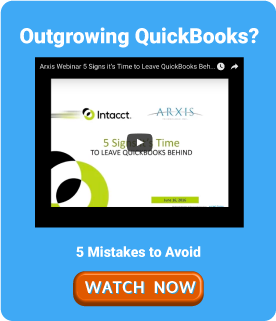How the various limitations of QuickBooks leave accountants out in the rain looking for a QuickBooks alternative.
The phenomenon is usually called the "butterfly effect." The name references the folksy story of a butterfly in Brazil indirectly causing a tornado in Texas by flapping its wings and setting in motion a new air pattern. The idea is that seemingly insignificant events and actions can have huge consequences down the line, something that many QuickBooks users feel each day even if they do not always notice it consciously:
- QuickBooks only accounts for one company per database file, meaning that accountants often have to log in and out of each entity's profile throughout the day to switch between them. Each individual session change may only take a few seconds, but the sustained effect is downright "butterfly"-esque: Hours and days of time are ultimately lost to simply logging into and back out of files. It's the accounting equivalent of a bunch of tiny air gusts transforming into huge headwinds.
- When it comes to automation, QuickBooks is behind the curve. It does
 not automatically update or balance due to/due from accounts, which only complicates matters for interrelated companies that routinely make loans to one another or pay bills on each other's behalf. It is easy for accountants to get stuck in that time-wasting login/logout cycle and also make mistakes such as overlooking transactions and not being able to find them until long after the fact.
not automatically update or balance due to/due from accounts, which only complicates matters for interrelated companies that routinely make loans to one another or pay bills on each other's behalf. It is easy for accountants to get stuck in that time-wasting login/logout cycle and also make mistakes such as overlooking transactions and not being able to find them until long after the fact. - To overcome the shortcomings of QuickBooks (including its lack of multi-entity support as well as its inability to report across multiple databases), many firms turn to Excel to help with reporting. Microsoft's spreadsheet application has its uses, but it is exceptionally risky for performing consolidations, elimination entries and distributions. The repeated copy-paste operations and manual data entry leave the door open for error. A single wrong Excel cell can have a cascading effect, messing up company finances across the board.

QuickBooks makes multiple entity management very difficult.
Overall, there are plenty of obvious signs that let you know that you are outgrowing QuickBooks. It's like noticing a dark cloudy sky and hearing the sound of thunder, knowing that a thunderstorm is quickly approaching. Identifying the issue is only part of the battle, however. While many accountants realize on some level that their reliance on QuickBooks and Excel makes their jobs more difficult, they can run into problems figuring out what they should do next.
So you have outgrown QuickBooks. Now what?
Someone staring down an impending snowstorm or downpour would likely know to get indoors or use an umbrella. When facing mounting issues with QuickBooks-based accounting practices, the solution might not seem as straightforward as that at first, but in reality, ditching QuickBooks and Excel is both doable and rewarding.
Use cloud financial to save time and cut manual processes
Among the main reasons that QuickBooks et al. still have a huge presence in so many accounting departments include: 1) inertia and 2) the perceived savings from just sticking with these on-premises solutions. However, it is often much more sustainable and cost-effective to upgrade to cloud accounting software.
To get a sense of the scope of wasted time and money, let's return for a second to all of those logins needed when switching between different entities in QuickBooks. IT research firm Gartner once estimated that up to 30 percent of IT help desk calls could be resolved with a simple password reset (i.e., they were basically requests to help with logging in). A developer of a password vault application estimated that these login issues resulted in $6 billion in lost productivity each year in the U.S. alone.
"Ditching QuickBooks and Excel is both doable and rewarding."
Although plenty of accountants do not have to recover lost passwords for QuickBooks and associated files, the time spent simply recalling and re-entering them (before occasional forgetfulness is even factored in) is massive. Plus, the likelihood of error only increases as more entities come into the mix. Inefficient workarounds and reliance on Excel only amplify the problem, making the status quo very expensive, not to mention unscalable for a growing business.
A cloud-based solution such as Intacct frees teams from these manual processes by:
- Automating multi-entity closing and reporting. Activities such as currency conversions, inter-entity transactions and local tax reporting can all be seamlessly handled from within a single architecture. A unified login system also allows any user with privileges to access entities without having to go through the login/logout rigmarole of QuickBooks.
- Providing intuitive yet almost endlessly customizable reporting options. More than 100 reports are built right into the application, making it easy to compare performance across business drivers and flag any trends of exceptions. Moreover, customizations remove the need to resort to Excel or external reporting tools just to get the insight that you need.
- Streamlining entity setups and consolidations. New entities can be easily created with configurable rules. Whether they inherit existing charts of accounts, lists, etc., or receive their own attributes, is up to the team. Managing multiple entities and currencies is more straightforward than ever - a push of the button is all they need to perform consolidations and produce reports that ensure auditability.
- Rooting itself in cloud-based infrastructure. When relying on on-premises software and manual activities, there is always the chance of technical failure such as system unavailability, which then requires costly maintenance. Software as a service includes infrastructure security and upkeep in the subscription fee. On top of that, the flexible nature of cloud financial software makes it possible to integrate with other applications such as Salesforce for customer relationship management.
Graduating from QuickBooks once and for all
The SMB accounting butterfly effect of the initially small inconveniences of QuickBooks snowballing into big financial problems down the line can be avoided by graduating to cloud financial solutions. Fast-growing businesses that have to handle large volumes of transactions, different currencies and multiple warehouses cannot afford to be held back by the limitations of QuickBooks and Excel.
Tools such as cloud ERP solutions ensure that they do not succumb to this fate. With deep support for multi-entity management along with comprehensive reporting, an intuitive user interface and reliable underlying cloud infrastructure, cloud financial software can handle the biggest accounting challenges of today and tomorrow. Accountants can be confident that their cloud-based tools will scale to match their operations, while also giving them process automation that eliminates reliance on time-wasting legacy tools. It's a way to stay out of an accounting "storm" and ensure long-term growth.




